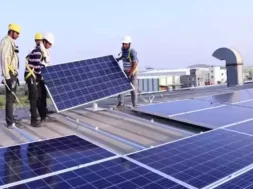
India has finally taken the giant step towards a unified Goods and Services Tax (GST) regime with the Rajya Sabha granting approval for the implementation of the much-awaited tax reform measure that was first proposed three decades ago.
The GST law seeks to subsume all central and state levies and was debated in the upper house of Parliament Wednesday. The GST implementation will be one of the “most significant reforms” affecting all factors of production and economics, according to Morgan Stanley.
RENEWABLES
One of the main energy sub-sectors to be impacted post the implementation of GST is renewables. The sector currently enjoys various fiscal incentives like 100 per cent tax holiday on earnings for 10 years, concessional excise and custom duties and so on. These incentives will come to an end in the new GST regime. The indirect tax reform through the GST could, therefore, hike renewable energy costs and pricing and hit investors.
The Ministry of New and Renewable Energy (MNRE) has already worked out a possible scenario of these impacts. The GST’s effect on cost of setting up of renewable projects would vary across segments, MNRE said in a recent report.
The impact includes a 16-20 per cent rise in Solar Off Grid costs; 12-16 per cent rise in Solar PV Grid installations and a 11-15 per cent jump in the cost of setting up wind energy projects. Also, biomass projects could see their costs rising by 11-14 per cent while setting up small hydro projects could become costlier by upto 11 per cent.
OIL & GAS
Analysts expect the impact of the new taxation regime on the oil and gas sector to be largely negative. This is because five petroleum products — crude, natural gas, Aviation Turbine Fuel, diesel and petrol — are excluded from the coverage of GST for the initial years while the remaining petroleum products — kerosense, naptha and Liquefied Petroleum Gas — are covered within the coverage of GST.
“Because of this peculiarity, this industry would be pained to comply with both the current tax regime as well as the GST regime,”said Abhishek Jain, tax partner at accounting and consultancy firm E&Y. He added the new regime would also result in non-creditable tax costs which would have an inflationary impact on the overall economy. For example, a refinery producing diesel and petrol will pay GST on the procurement of plant, machinery and services. This tax would not be creditable against the excise duty and VAT which would be levied on petrol and diesel.
ELECTRICAL EQUIPMENT
The new GST regime is likely to benefit the lighting and electrical sector significantly through an overall reduction in tax rates. Under the new tax structure, the overall incidence of effective indirect taxes on the companies in the sector will be lowered to around 18 per cent from the current 29-30 per cent, according to equity brokerage firm Motilal Oswal.
“We believe GST will be more positive for the Light Electricals segment where companies may benefit from volume growth and margin expansion,” the firm said in a report. It added the benefits of this lower tax incidence will be passed on to customers, for the industrial capital goods, owing to the current weak demand scenario.














